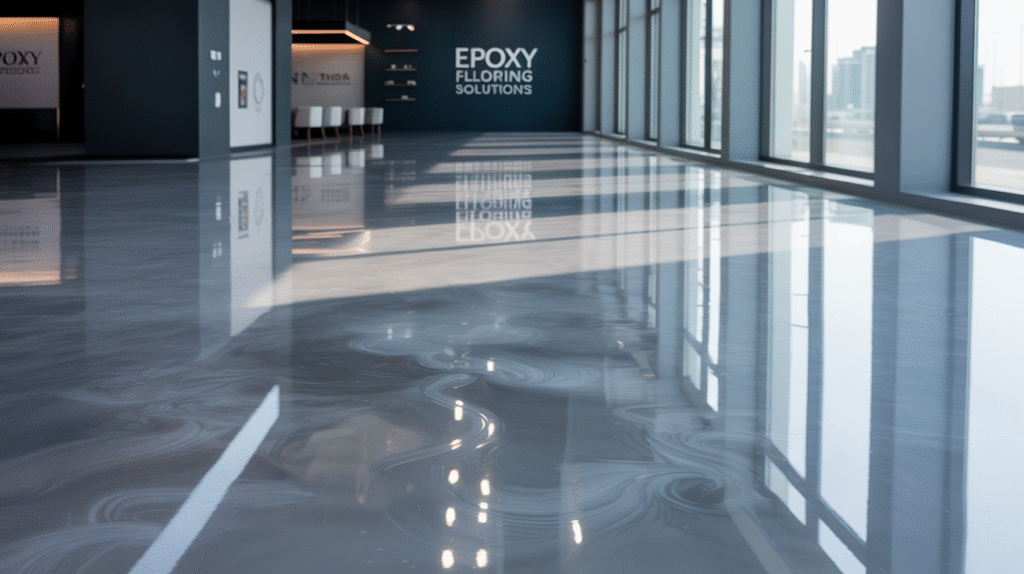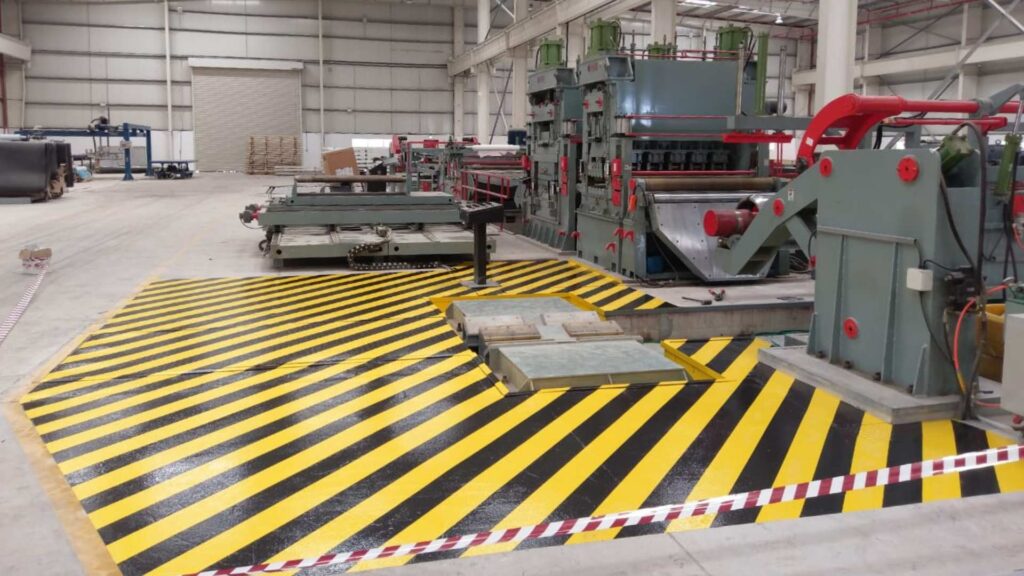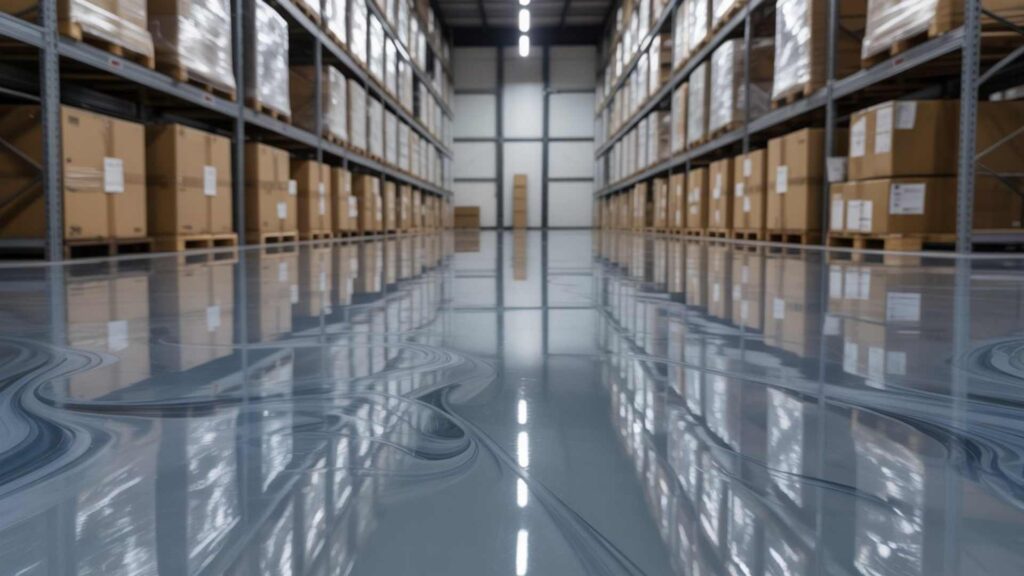Warehouse floors in Dubai face some of the toughest conditions in the world. High summer temperatures often exceed 40°C, humidity fluctuates with seasonal changes, and sand adds constant abrasion. Add to this the heavy loads of forklifts, pallet trucks, and constant foot traffic, and the importance of durable flooring becomes clear. Choosing the right system is about ensuring longevity, safety, and cost efficiency, not just the aesthetics.
This article explores the best warehouse flooring options tailored to Dubai’s climate and operational challenges.
Table of Contents
1. Epoxy Flooring
Epoxy remains one of the most widely used flooring systems for industrial facilities. It forms a smooth, non-porous layer that resists chemicals, dust, and constant forklift traffic. For Dubai, epoxy’s strength lies in its ability to withstand both heat and seasonal moisture without buckling or warping. Since it seals off the underlying concrete, it also reduces dust, a key concern in desert conditions where fine particles easily spread inside facilities.
Installation Tip: Use UV-stable topcoats for sun-exposed areas, and allow 3–7 days curing before full load use.
Heat Outgassing Playbook for Epoxies
In Dubai’s peak summer months, resin systems can suffer from outgassing when hot slabs release trapped air. To prevent pinholes and bubbles, contractors should apply primers and topcoats as the concrete cools in the late afternoon or night. Using low-viscosity primers ensures deeper penetration into pores, creating a smoother, longer-lasting epoxy finish.
2. Polished Concrete
Polished concrete has become a cost-efficient choice for large warehouses. Its dense, hardened surface reflects light, improving visibility inside expansive spaces and lowering lighting costs. It handles heavy machinery without wearing out, and unlike coated systems, there’s no surface layer that can peel under heat. In Dubai’s environment, polished concrete remains stable through extreme temperature variations, making it a long-term solution for operators who want durability with minimal maintenance.
Maintenance Tip: Periodic burnishing or application of protective guard plus routine cleaning with neutral cleaners preserves reflectivity and longevity.
Light Reflectance & Energy Savings
Polished concrete not only improves visibility but also boosts overall light reflectance values (LRV). In wide-span warehouses, this reflective surface reduces reliance on artificial lighting, lowering operational energy costs—an important advantage in Dubai’s large distribution centers where energy efficiency translates into significant savings.
3. Polyurethane (PU) Flooring
Polyurethane flooring offers excellent flexibility compared to epoxy, which makes it suitable for facilities where temperature shifts and humidity are high. This system resists thermal expansion and contraction, helping prevent cracks and surface failures. In coastal parts of Dubai, where moisture levels rise, PU flooring provides an extra layer of protection by preventing water penetration. It’s also known for being softer underfoot, which reduces strain on workers during long shifts.
Thermal-Shock Zones: PU-Cement Advantage
For freezers, wash-down areas, or dock thresholds, PU-cement systems outperform standard PU. They tolerate extreme swings from sub-zero cold to hot water cleaning without cracking or softening. This makes them ideal for Dubai warehouses handling frozen foods or operating under frequent sanitization protocols.
4. Vinyl Flooring
Vinyl is a practical option for warehouses where aesthetics matter as much as durability—for example, retail distribution centers or facilities that double as showroom spaces. It’s resistant to stains and easy to clean, which supports hygiene in food and pharmaceutical storage. In Dubai’s climate, vinyl performs well indoors with controlled cooling. It is less ideal for facilities with heavy outdoor exposure, but it works effectively in climate-regulated environments.
Low-VOC Options for Green Compliance
Vinyl and LVT systems with low-VOC adhesives are increasingly specified under Dubai Municipality’s Al Sa’fat green building rating system. These options support indoor air quality (IAQ) targets and ease approvals for warehouses pursuing sustainability certifications.
5. Rubber Flooring
Rubber flooring, though less common in heavy-duty storage, has advantages for specialized warehouses. Its natural shock absorption reduces noise and protects equipment from vibration damage. This makes it useful in facilities handling sensitive electronics or precision instruments. Rubber also stays slip-resistant even in humid conditions, lowering accident risks. For businesses in Dubai managing delicate cargo, rubber provides a safe and controlled surface.
ESD Protection for Sensitive Equipment
In e-commerce or electronics storage zones, electrostatic discharge (ESD) poses risks to sensitive goods. Rubber flooring can be upgraded with conductive finishes compliant with IEC 61340-5-1, ensuring safe handling of circuit boards, sensors, and electronic components
6. Hybrid & Specialized Coatings
Some warehouses require flooring that combines different properties. Hybrid coatings—like epoxy with PU topcoats—balance chemical resistance, flexibility, and thermal tolerance. In Dubai, where warehouses often run multiple operations under one roof, hybrid solutions offer customization. For example, a facility may apply epoxy in high-traffic zones and PU near loading bays exposed to humidity. These systems are gaining traction as operators seek more tailored solutions.
Moisture Mitigation Strategies
Older Dubai warehouses without vapor barriers often face ground moisture intrusion. Before applying hybrid coatings, in-situ relative humidity (RH) tests per ASTM F2170 should be carried out. If RH is high, contractors should install a moisture vapor barrier (MVB) epoxy layer, reducing risks of blistering or delamination.
7. Engineered Wood
Engineered wood flooring brings a balance of durability and aesthetic appeal to warehouses with office or showroom components. Its layered construction resists warping and swelling, which is particularly valuable in Dubai’s fluctuating humidity. While it cannot handle extremely heavy machinery, engineered wood provides a warm, professional look in spaces where employees or clients spend time, making it ideal for mixed-use facilities that blend storage with administrative or customer-facing areas.
Climate-Resistant Layered Construction
Engineered wood floors in Dubai benefit from multi-ply construction that minimizes warping during humidity spikes. For facilities with office-adjacent areas, specifying products tested under EN 13489 dimensional stability standards ensures better long-term performance compared to conventional timber.
8. Natural Stone & Tiles
Natural stone and tile flooring deliver premium durability with easy maintenance, especially in warehouses that host light-to-medium traffic or require hygienic surfaces. Materials like granite, porcelain, or ceramic withstand scratches, chemical spills, and temperature variations without losing integrity. In Dubai’s environment, stone and tiles remain stable under heat, resist moisture, and reflect light, enhancing visibility. Their polished finish can elevate facility aesthetics, making them a suitable choice for distribution centers with showroom or visitor zones while maintaining long-term performance.
Slip-Resistance Testing for Safety
Smooth tiles may become slippery in humid or wash-down zones. Facility managers should require slip-resistance certification—such as BS 7976 Pendulum Test Value (PTV ≥ 36 wet) or DIN 51130 R11–R12—to ensure flooring meets workplace safety benchmarks.
Quick Comparison of Flooring Options
Flooring Type | Heat & Humidity Resistance | Durability | Maintenance | Ideal Use |
Epoxy | Moderate (with UV coating) | High | Medium | General zones, medium traffic |
Polished Concrete | High | Very High | Low | High-traffic DCs, heavy machinery |
PU Flooring | Excellent | Very High | Low | Cold storage, coastal, hygiene zones |
Vinyl / LVT | Good | Moderate | Low | Showrooms, light-traffic warehouses |
Rubber | Good | Medium | Low | Sensitive equipment storage |
Hybrid / Specialized | Excellent | Very High | Medium | Mixed-use, customized zones |
Engineered Wood | Good | Medium | Medium | Office-adjacent warehouses, showroom areas |
Natural Stone & Tiles | High | High | Low | Light-to-medium traffic, hygienic zones |
Selection Guidelines for Dubai Warehouses
- Traffic and load: Heavy machinery favors PU or polished concrete.
- Environmental exposure: UV-stable epoxy or tiles protect sun-exposed areas.
- Hygiene requirements: F&B or pharma warehouses require antimicrobial finishes and coving.
- Maintenance capacity: Consider low-maintenance options like polished concrete for large operations.
- Lifecycle costs: Durable systems reduce downtime and repair costs over time.
- Dust & sand management: Regular sweeping or mechanical cleaning is essential to prevent abrasion, especially for epoxy and PU floors.
Installation planning: Account for curing times to minimize operational disruption
Joint Protection & Floor Flatness for MHE
Heavy forklift traffic in Dubai distribution centers often leads to joint spalling and surface unevenness. To counter this, armoured joint systems and semi-rigid fillers should be specified in high-traffic zones. For warehouses operating very narrow aisle (VNA) forklifts or autonomous mobile robots (AMRs), slab flatness should follow TR34 FM2 tolerance standards to minimize equipment wear and increase operational safety
Conclusion
Selecting the right warehouse flooring in Dubai is essential for operational efficiency, worker safety, and long-term savings. Durra Altaj provides expert guidance on matching flooring systems to climate conditions and operational requirements. PU flooring excels in humid and temperature-variable zones, epoxy provides cost-effective coverage with UV protection, and polished concrete suits high-traffic areas seeking minimal maintenance. Vinyl and rubber offer flexibility for light-duty or specialized storage needs.
With proper planning and expert implementation, warehouse floors in Dubai can deliver safety, durability, and efficiency for years
Dust & Sand Management Plan
Even the best flooring system in Dubai requires a dust-control strategy. Ride-on sweepers with HEPA or Gore filtration help remove fine desert sand before it causes abrasion. This maintenance detail extends the gloss, slip resistance, and lifespan of resin and concrete finishes.
FAQs
How long does each flooring type last in Dubai?
PU and polished concrete can last 15–20 years with proper maintenance, epoxy 8–12 years depending on traffic and exposure, vinyl 5–10 years, and rubber 5–8 years.
Can epoxy withstand Dubai’s extreme heat?
Yes, when UV-stable topcoats are applied, epoxy remains strong under high temperatures.
Is PU flooring better than epoxy in humid areas?
Yes. PU is more flexible and moisture-resistant, reducing the risk of cracking or delamination.
What maintenance does polished concrete require?
Periodic burnishing or guard application, plus routine cleaning with neutral cleaners, keeps the floor durable and reflective.
Which flooring is safest for sensitive equipment?
Rubber flooring reduces vibrations and remains slip-resistant, protecting delicate electronics and instruments.



